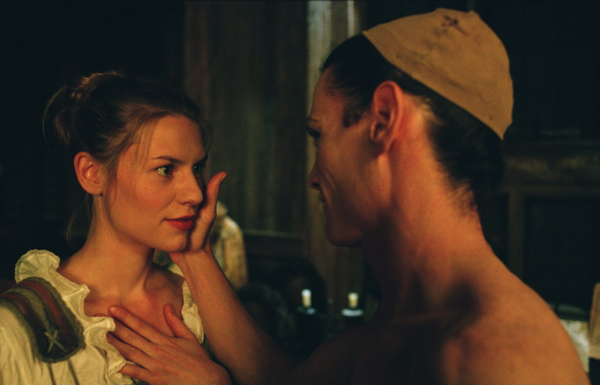Movie review by Greg Carlson
Evoking that unique but difficult blend of period charm and contemporary performances, “Stage Beauty” operates with the same anachronistic spirit as “Shakespeare in Love.” Based on the play “Compleat Female Stage Beauty” by Jeffrey Hatcher, the movie version works hard to mine the gender politics of the London stage during the reign of Charles II, when only men could legally appear on the boards (meaning of course, that all female roles had to be essayed by the fellas). The era would see the demise of the men-as-women tradition, and the movie does incorporate fictionalized versions of several historical figures. The result, however, is a mélange of styles and concerns that leave many of the performers stewing in their own overactive creative juices.
Billy Crudup is Ned Kynaston, one of the very last actors to make most of his living playing women in Restoration Britain. Kynaston draws adoring crowds of male and female admirers, and seems content to find pleasure with groupies of the opposite sex as well as with the Duke of Buckingham (Ben Chaplin), who prefers to treat Kynaston like a lady in most respects. A handful of events unfortunate for Kynaston conspire to pull down his world around him: his haughty young dresser Maria Hughes (Claire Danes, good but not ideally suited for the role) has taken to performing onstage illegally, he insults a wealthy courtier who comes on to him, and he discovers that the King’s mistress Nell Gwynn (a vivacious Zoe Tapper) harbors her own desire to act in the theatre.
Before you can say obsolescence, the pretty Kynaston is fighting for his livelihood, as the lusty monarch has decreed that women are now free to perform in public. Director Richard Eyre navigates these middle sections of the film with welcome balance, and the audience simultaneously experiences Kynaston’s despair at losing his stardom and Maria’s exhilaration at ascending into the favor of the rich and powerful. Not everything works, though. The material’s most relevant subtexts, such as the socially sanctioned acceptability of homophobia, end up ignored in favor of a weird, nonsensical love scene in which Kynaston and Maria discuss the mechanics of straight versus gay sex.
“Stage Beauty” ends up missing the boat because its central characters remain undefined. Questions swirling around Kynaston’s own sexuality are left purposefully ambiguous, but instead of generating opportunities to investigate the man’s complex emotional landscape, the movie adopts an all too easy resolution in which Kynaston can happily abandon his hard-earned expertise as a premier drag performer in favor of accepting the demands that he play it straight from now on. The old mythology that one can be “turned” disappointingly manifests in the most traditionally progressive of places.
While the movie has earned several inevitable comparisons to “Shakespeare in Love,” “Stage Beauty” really reminds viewers who love backstage drama of Peter Yates’ 1983 film version of “The Dresser.” That movie, a modern classic, probed nearly all of the psychological terrain that should have been part of “Stage Beauty” (incidentally, actor Edward Fox appears in both movies). While “Stage Beauty” labors in vain to understand the rivalries, jealousies, and conflicted feelings that so often govern the fragile egos of performers and theatre folk, “The Dresser” succeeded by always putting a human face on the struggles. As it is, the Ned Kynaston of “Stage Beauty” remains opaque, elusive, and frustratingly out of reach.
